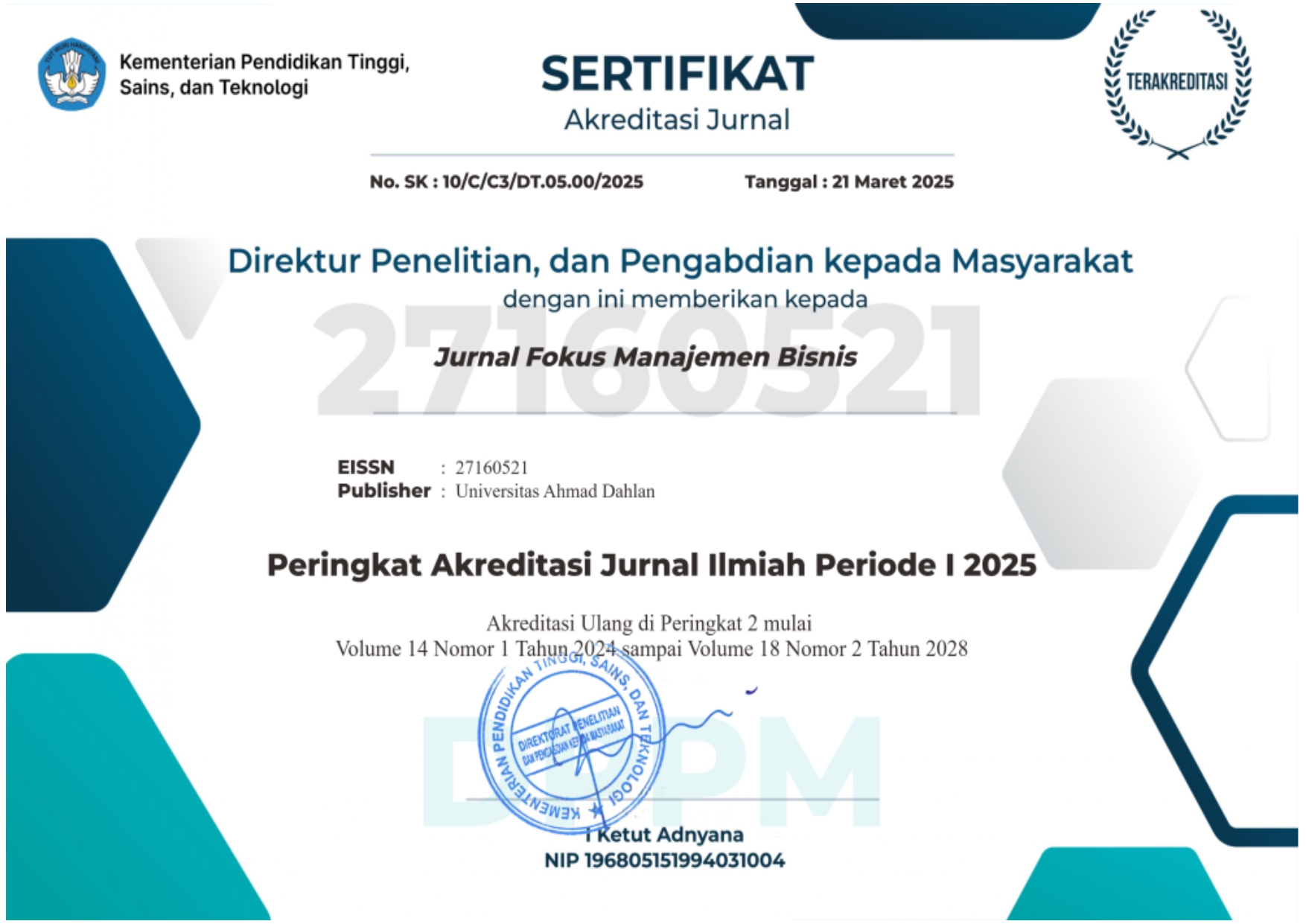PENGARUH KOMPENSASI, KEPUASAN KERJA, DAN STRES KERJA TERHADAP TURNOVER INTENTION
DOI:
https://doi.org/10.12928/fokus.v12i2.6665Abstract
The success of an organization can be portrayed by the employee turnover intention rate each month. Employee turnover intention can be influenced by compensation, job satisfaction, and work stress. The purpose of this study is to test and analyze the relationship among compensation factors, job satisfaction, and work stress on employees at PT. Tanjung Kreasi Parquet Industri (TKPI). This study was conducted in a Quantitative research method with multiple regression analysis. The population of this study was all production employees. The sampling technique used was purposive sampling with a total of 201 employees. The results of the study prove that compensation and job satisfaction have a negative effect on turnover intention, while work stress has a positive effect on turnover intention.
References
Al Jenaibi, B. (2010). Job Satisfaction: Comparisons Among Diverse Public Organizations In The UAE. Management Science and Engineering, 4(3).
Anees, R. T., Heidler, P., Cavaliere, L. P. L., & Nordin, N. A. (2021). Brain Drain in Higher Education. The Impact of Job Stress and Workload on Turnover Intention and the Mediating Role of Job Satisfaction at Universities. European Journal of Business and Management Research, 6(3).
Arikunto, S. (2002). Metodologi Penelitian Suatu Pendekatan Proposal.
Aydogdu, S. & asikgil. (2011). An Empirical Study of the Relationship Among Job Satisfaction, Organizational Commitment and Turnover Intention. International Review of Management and Marketing, 1(3).
Azanza, G., Moriano, J. A., Molero, F., & Lévy Mangin, J. P. (2015). The Effects Of Authentic Leadership On Turnover Intention. Leadership and Organization Development Journal, 36(8).
Chen, I. H., Brown, R., Bowers, B. J., & Chang, W. Y. (2015). Work-To-Family Conflict As A Mediator Of The Relationship Between Job Satisfaction And Turnover Intention. Journal of Advanced Nursing, 71(10).
Chen, M. F., Lin, C. P., & Lien, G. Y. (2011). Modelling Job Stress As A Mediating Role In Predicting Turnover Intention. Service Industries Journal, 31(8).
Chen, Y., Wang, C., & Cheng, W. (2010). Structural Investigation Of The Relationship Between Working Satisfaction And Employee Turnover. The Journal of Human …, 6(1).
Cho, Y. J., & Lewis, G. B. (2012). Turnover Intention and Turnover Behavior: Implications for Retaining Federal Employees. Review of Public Personnel Administration, 32(1).
Chung, H., Quan, W., Koo, B., Ariza-Montes, A., Vega-Muñoz, A., Giorgi, G., & Han, H. (2021). A Threat Of Customer Incivility And Job Stress To Hotel Employee Retention: Do Supervisor And Co-Worker Supports Reduce Turnover Rates? International Journal of Environmental Research and Public Health, 18(12).
Dessler, G. (2013). Fundamentals of Human Resource Management. Pearson.
Elçi, M., Şener, İ., Aksoy, S., & Alpkan, L. (2012). The Impact of Ethical Leadership and Leadership Effectiveness on Employees’ Turnover Intention: The Mediating Role of Work Related Stress. Procedia - Social and Behavioral Sciences, 58.
Ghozali, I. (2018). Aplikasi Analisis Multivariate dengan Program IBM SPSS 25. Universitas Diponegoro.
Hakim, A. L., Sudarmiatin, & Sutrisno. (2018). The Effect of Work Stress on Turnover Intention with Work Satisfaction and Commitment as Intervening Variable (Study at PT Infomedia Solusi Humanika in Malang). European Journal of Business and Management, 10(12).
Hasibuan, M. S. (2009). Manajemen Dasar, Pengertian, dan Masalah. Bumi Aksara.
Heider, F. (2005). The Psychology Of Interpersonal Relations. In The Psychology Of Interpersonal Relations.
Heshizer, B. (1994). The Impact Of Flexible Benefits Plans On Job Satisfaction, Organizational Commitment And Turnover Intentions. Benefits Quarterly, 10(4).
Judge, T. A., Cranny, C. J., Smith, P. C., & Stone, E. F. (1994). Job Satisfaction: How People Feel about Their Jobs and How It Affects Their Performance. Administrative Science Quarterly, 39(1).
Khan, M. A. (2014). Organizational Cynicism And Employee Turnover Intention: Evidence From Banking Sector In Pakistan. Pakistan Journal of Commerce and Social Sciences, 8(1).
Klassen, R. M., & Chiu, M. M. (2011). The Occupational Commitment And Intention To Quit Of Practicing And Pre-Service Teachers: Influence Of Self-Efficacy, Job Stress, And Teaching Context. Contemporary Educational Psychology, 36(2).
Kuvaas, B., Buch, R., Gagné, M., Dysvik, A., & Forest, J. (2016). Do You Get What You Pay For? Sales Incentives And Implications For Motivation And Changes In Turnover Intention And Work Effort. Motivation and Emotion, 40(5).
Lai, M. C., & Chen, Y. C. (2012). Self-Efficacy, Effort, Job Performance, Job Satisfaction, And Turnover Intention: The Effect Of Personalcharacteristics On Organization Performance. International Journal of Innovation, Management and Technology, 3(4).
Li, J. J., Lee, T. W., Mitchell, T. R., Hom, P. W., & Griffeth, R. W. (2016). The Effects Of Proximal Withdrawal States On Job Attitudes, Job Searching, Intent To Leave, And Employee Turnover. Journal of Applied Psychology, 101(10).
Li, J., Liu, H., Van Der Heijden, B., & Guo, Z. (2021). The Role Of Filial Piety In The Relationships Betweenwork Stress, Job Satisfaction, And Turnover Intention: A Moderated Mediation Model. International Journal of Environmental Research and Public Health, 18(2).
Liu, S. (2012). The Influences Of School Climate And Teacher Compensation On Teachers’ Turnover Intention In China. Educational Psychology, 32(5).
Mathis, R. L., & Jackson, J. H. (2008). Human Resource Management. Thomson/South-western.
Memon, M. A., & Salleh, R. (2017). The Mediating Role Of Work Engagement Between Pay Satisfaction And Turnover Intention. International Journal of Economics, Managemenr and Accounting, 25(1).
Mobley, W. H., Griffeth, R. W., Hand, H. H., & Meglino, B. M. (1979). Review And Conceptual Analysis Of The Employee Turnover Process. Psychological Bulletin, 86(3).
Murdani, A. A., & Fachrurrozie, F. (2022). Pengaruh Kepuasan Kerja Dan Komitmen Organisasi Terhadap Turnover Intention Auditor. Jurnal Akuntansi, Ekonomi Dan Manajemen Bisnis, 2(1).
Nyoman, N., Mita, A., Anjani, D., & Rahyuda, A. G. (2020). The Role of Organizational Commitments in Mediating the Effect of Job Insecurity on Turnover Intention on Non-Permanent Employees. American Journal of Humanities and Social Sciences Research, 11.
Ongori, H. (2007). A Review of The Literature On Employee Turnover.
Purwanto, A. (2020). Effect Of Compensation And Organization Commitment On Tournover Intention With Work Satisfaction As Intervening Variable In Indonesian Industries. Sys Rev Pharm.
Robbins, S. P., & Judge, T. A. (2018). Organizational Behavior What’s New in Management. Pentice Hall: Upper Saddle River.
Rofi’i, M. (2014). Pengaruh Kompensasi Dan Iklim Organisasi Terhadap Turnover Intension Dengan Kepuasan Kerja Sebagai Variable Intervening. Jurnal Dinamika Manajemen, 2(2).
Ross, R. R., & Altmaier, E. M. (1994). Intervention in occupational stress: A handbook of counselling for stress at work. In Intervention in occupational stress: A handbook of counselling for stress at work.
Russ, F. A., & McNeilly, K. M. (1995). Links Among Satisfaction, Commitment, And Turnover Intentions: The Moderating Effect Of Experience, Gender, And Performance. Journal of Business Research, 34(1).
Schwab, K. (2017). The Fourth Industrial Revolution.
Sheraz, A., Wajid, M., Sajid, M., Qureshi, W. H., & Rizwan, M. (2014). Antecedents of Job Stress and its impact on employee’s Job Satisfaction and Turnover Intentions. International Journal of Learning and Development, 4(2).
Sugiyono. (2015). Metode Penelitian dan Pengembangan Pendekatan Kualitatif, Kuantitatif, dan R&D. In Metode Penelitian dan Pengembangan Pendekatan Kualitatif, Kuantitatif, dan R&D. Alfabeta.
Tnay, E., Othman, A. E. A., Siong, H. C., & Lim, S. L. O. (2013). The Influences of Job Satisfaction and Organizational Commitment on Turnover Intention. Procedia - Social and Behavioral Sciences, 97.
Vischer, J. C. (2007). The Effects Of The Physical Environment On Job Performance: Towards A Theoretical Model Of Workspace Stress. In Stress and Health (Vol. 23, Issue 3).
Vizano, N. A., Sutawidjaja, A. H., & Endri, E. (2021). The Effect of Compensation and Career on Turnover Intention: Evidence from Indonesia. Journal of Asian Finance, Economics and Business, 8(1).
Downloads
Published
How to Cite
Issue
Section
License
Copyright (c) 2022 Erika Putri, Friztina Anisa

This work is licensed under a Creative Commons Attribution-ShareAlike 4.0 International License.
Authors who publish with this journal agree to the following terms:Â
- Authors retain copyright and grant the journal right of first publication with the work simultaneously licensed under a Creative Commons Attribution License that allows others to share the work with an acknowledgment of the work's authorship and initial publication in this journal.
- Authors are able to enter into separate, additional contractual arrangements for the non-exclusive distribution of the journal's published version of the work (e.g., post it to an institutional repository or publish it in a book), with an acknowledgment of its initial publication in this journal.
- Authors are permitted and encouraged to post their work online (e.g., in institutional repositories or on their website) prior to and during the submission process, as it can lead to productive exchanges, as well as earlier and greater citation of published work (See The Effect of Open Access).







